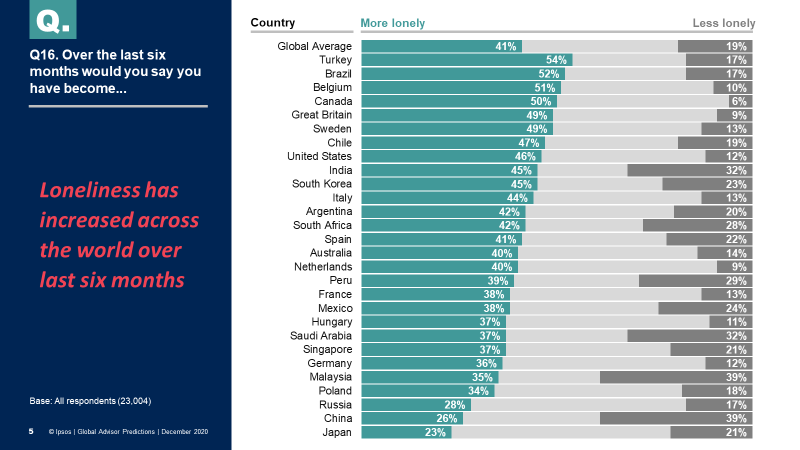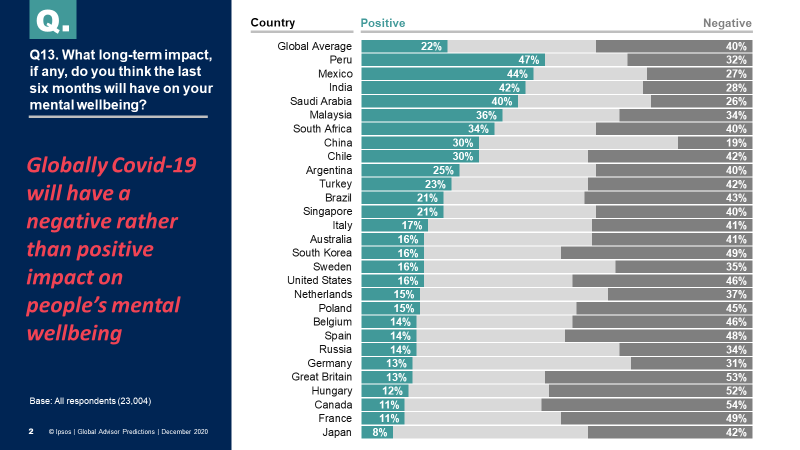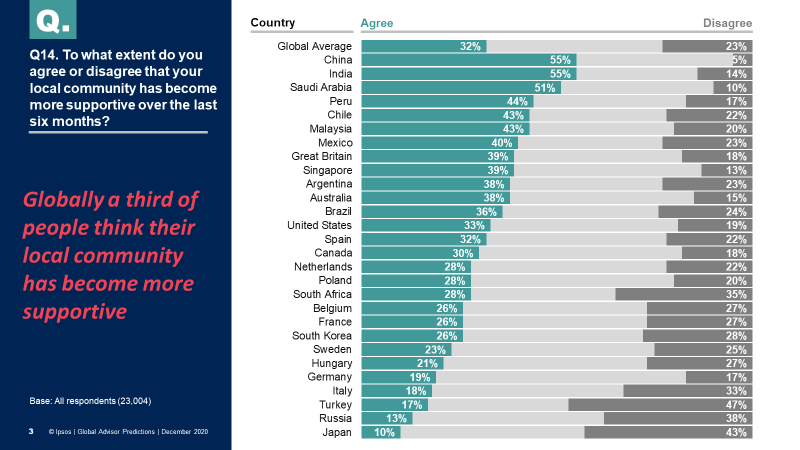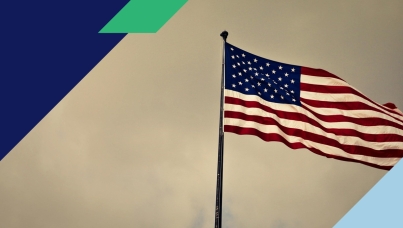Half of Americans surveyed report feeling more lonely
Washington, DC, March 1, 2021 — A new 28-market survey conducted between December 23, 2020 and January 8, 2021, by Ipsos on its Global Advisor online platform finds that loneliness has increased across the world. In the U.S. specifically, 46% of adults surveyed say that they have become lonelier in the past six months - compared to only 12% who say that they have become less lonely.
- The U.S. sits slightly ahead of the global country average, where two in five people (41%) report becoming lonelier over the last 6 months, while one in five (19%) have become less lonely.
- Countries where the highest proportions of people have become lonelier include: Turkey (54%), Brazil (52%), Belgium (51%), Canada (50%) and Great Britain (49%).
- Countries where the smallest proportions of people say they've become lonelier include Malaysia (35%), Poland (34%), Russia (28%), China (26%) and Japan (23%).

Additionally, one in three (31%) adults in the U.S. say that they feel lonely often/always/some of the time, on par with the global country average (33%).
The survey also found that Americans are nearly three times more likely to believe the last six months will have a negative long-term impact on their mental wellbeing than think it will have a positive impact (46% and 16%, respectively).
- Looking at the comparative set, countries where people are most likely to say the pandemic will have a positive impact on their mental wellbeing are: Peru (47%), Mexico (44%), India (42%), Saudi Arabia (40%) and Malaysia (36%).
- This contrasts with the following countries where the smallest proportions believe it will have a positive impact: Great Britain (13%), Hungary (12%), Canada (11%), France (11%) and Japan (8%).

On the bright side, a third of adults in the U.S. say that their local community has become more supportive over the last six months (33%). Less than one in five disagree (19%). Results for the U.S. are on par with the global average, where 32% agree.
- In other markets, China and India (both 55%) are most likely to agree their local community has become more supportive over the last six months, followed by Saudi Arabia (51%), Peru (44%), Chile (43%), Malaysia (43%), Mexico (40%) and Great Britain (39%), Singapore (39%) and Argentina (38%).
- The country with the highest proportion disagreeing that their local community has become more supportive is Turkey, with almost half of people agreeing this is the case (47%). Other countries unlikely to say their community has become more supportive over the last six months are Turkey (17%), Russia (13%) and Japan (10%).
About the Study
These are the results of a 28-market survey conducted by Ipsos on its Global Advisor online platform. Ipsos interviewed a total of 23,004 adults aged 18-74 in Singapore, 18-74 in the United States, Canada, Malaysia, South Africa and Turkey, 21-74 in Singapore and 16-74 in 22 other markets between 23 December 2020 and 8 January 2021.
The sample consists of approximately 1,000 individuals in each of Australia, Belgium, Brazil, Canada, mainland China, France, Germany, Great Britain, Italy, Japan, Spain and the U.S., and 500 individuals in each of Argentina, Chile, Hungary, India, Malaysia, Mexico, the Netherlands, Peru, Poland, Russia, Saudi Arabia, Singapore, South Africa, South Korea, Sweden, and Turkey.
The samples in Argentina, Australia, Belgium, Canada, France, Germany, Great Britain, Hungary, Italy, Japan, the Netherlands, Poland, South Korea, Spain, Sweden and the U.S. can be taken as representative of their general adult population under the age of 75.
The samples in Brazil, Chile, mainland China, India, Israel, Malaysia, Mexico, Peru, Russia, Saudi Arabia, Singapore, South Africa, and Turkey are more urban, more educated, and/or more affluent than the general population. The survey results for these markets should be viewed as reflecting the views of the more "connected" segment of their population.
The data is weighted so that each country's sample composition best reflects the demographic profile of the adult population according to the most recent census data. The “Global Average” reflects the average result for all the countries where the survey was conducted. It has not been adjusted to the population size of each country and is not intended to suggest a total result
Where results do not sum to 100 or the 'difference' appears to be +/-1 more/less than the actual, this may be due to rounding, multiple responses, or the exclusion of "don't know" or not stated responses.
The precision of Ipsos online polls is calculated using a credibility interval with a poll of 1,000 accurate to +/- 3.5 percentage points and of 500 accurate to +/- 5.0 percentage points. For more information on Ipsos' use of credibility intervals, please visit the Ipsos website. The publication of these findings abides by local rules and regulations.
For more information on this news release, please contact:
Nicolas Boyon
Senior Vice President, U.S., Public Affairs
+1 646 309 4879
[email protected]
Kate Silverstein
Media Relations Specialist, U.S., Public Affairs
+1 718 755 8829
[email protected]
About Ipsos
Ipsos is the world’s third largest market research company, present in 90 markets and employing more than 18,000 people.
Our passionately curious research professionals, analysts and scientists have built unique multi-specialist capabilities that provide true understanding and powerful insights into the actions, opinions and motivations of citizens, consumers, patients, customers or employees. We serve more than 5000 clients across the world with 75 business solutions.
Founded in France in 1975, Ipsos is listed on the Euronext Paris since July 1st, 1999. The company is part of the SBF 120 and the Mid-60 index and is eligible for the Deferred Settlement Service (SRD).
ISIN code FR0000073298, Reuters ISOS.PA, Bloomberg IPS:FP www.ipsos.com




